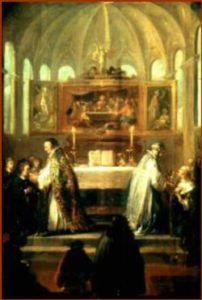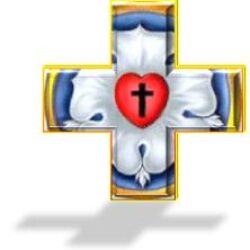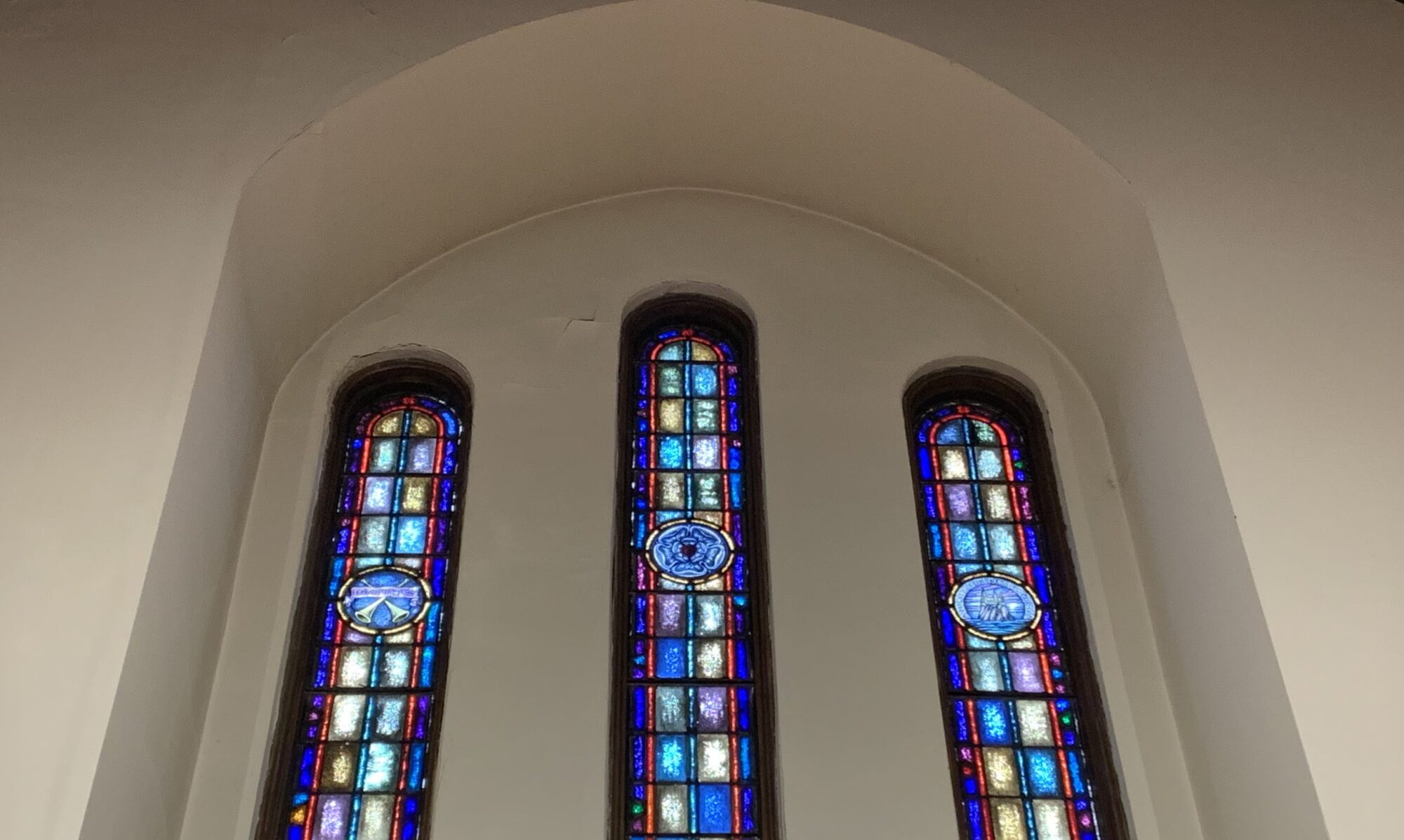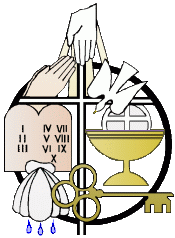
Which path toward membership is determined to a large degree by the individual’s background. Meeting with the pastor is the best place to start. But generally speaking, the following description of the paths toward baptized, communicant membership are followed or adapted:

+ TRANSFER – For those coming from another congregation of The Lutheran Church – Missouri Synod (or a congregation in our church fellowship, such as TAALC or LCC), who are already baptized communicant members of their previous congregation, are usually simply transferred by action of both congregations.
+ GENERAL ADULT CATECHISM CLASS – For those coming from non-Lutheran Christian background (for example Roman Catholic, Episcopal, Methodist, Baptist, non-denominational, etc.) usually adult catechesis (instruction) is held to cover biblical teaching as summarized in the catechism and to cover the historic Lutheran liturgy. This course usually will go for some months, but usually less than a year. Because of divergent issues between the LCMS and the ELCA, prospective members from congregations of the ELCA may have some potential instruction after pastoral conversations.
+ ADULT CATECHISM CLASS WITH EXTRA ATTENTION – For those coming with no or little Christian background thorough catechesis (instruction) will be needed toward both receiving Holy Baptism, public affirmation of the Lutheran confession of the faith, and to be received as a communicant member of the congregation. In mind for this path are those coming from non-Christian religions or no religion at all (for example Buddhist, Muslim, Mormon, Jehovah’s Witness, atheist, pagan, unitarian).
For those coming from other Christian denominations and are already baptized, we want to ensure in these days that such were baptized with water in the name of the Father and of the Son and of the Holy Spirit. For those baptized with water in the name of the Father and of the Son and of the Holy Spirit, there is no need for another baptism and it would be wrong to have another one. Those baptized among Mormons or Jehovah’s Witnesses or Oneness Pentecostals will need to be baptized again, so to speak, though in such cases those baptisms were not properly Scriptural.
YOUTH CATECHESIS – Baptized youths at Grace now are typically going through Catechism Class (“confirmation”) during middle school years, with some flexibility as to which grade or the precise age. Our concern has to do with the student’s readiness as well as the commitment of the parent(s).
Parents seeking the sacrament of Holy Baptism for their infant children are asked to meet with the pastor regarding this. The pastor will need to speak with those who have parental or legal guardian status regarding children to be baptized.

ADMISSION TO THE LORD’S SUPPER IN THE STEWARDSHIP OF THE SACRAMENT
The Lord’s Supper is to be shared in the church only by those who:
1. are baptized in the name of the Father and of the Son and of the Holy Spirit.
2. have been taught thoroughly the basics of the Christian faith and have affirmed it publicly, renouncing error, and have been admitted by the called and ordained servant of the Word in this good order. This is part of the purpose of the rite of confirmation being conducted in the Divine Service after thorough instruction in the faith.
3. live in daily repentance and faith in Christ
FURTHER DETAILED READING ON ADMISSION TO THE LORD’S SUPPER AND CHURCH FELLOWSHIP
The Lord’s Supper is given in the Scriptural confidence that the blessed bread and wine are the very body and very blood of our Lord Jesus Christ. This is the historic, biblical, Christian understanding of the sacrament of Holy Communion, the Eucharist. The chief benefit of the Lord’s Supper is the forgiveness of sins, but it is also an expression of our unity in the teachings of the Christian faith. Agreement in God’s Word in all of its articles is prerequisite to partaking in the Holy Communion together, otherwise it would be disunion, and a violation against God’s truth. The practice of closed communion is what was practiced in the Christian church from the earliest of times. So this practice is not unique to the Grace Lutheran Church nor the Missouri Synod. (For more on this see the book by Werner Elert – Eucharist and Church Fellowship in the First Four Centuries.)
St. John writes in his Second Epistle:
9 Everyone who goes on ahead and does not abide in the teaching of Christ, does not have God. Whoever abides in the teaching has both the Father and the Son. 10 If anyone comes to you and does not bring this teaching, do not receive him into your house or give him any greeting, 11 for whoever greets him takes part in his wicked works. (2 John)
Likewise Scripture says in Romans:
17 I appeal to you, brothers, to watch out for those who cause divisions and create obstacles contrary to the doctrine that you have been taught; avoid them. (Romans 16:17)
Not only this, but where there are those who do not acknowledge that the sacrament is actually the body and blood of Jesus given for the forgiveness of sins, they receive this sacrament to their spiritual detriment. It says in 1 Corinthians 11:
26 For as often as you eat this bread and drink the cup, you proclaim the Lord’s death until he comes.27 Whoever, therefore, eats the bread or drinks the cup of the Lord in an unworthy manner will be guilty concerning the body and blood of the Lord. 28 Let a person examine himself, then, and so eat of the bread and drink of the cup. 29 For anyone who eats and drinks without discerning the body eats and drinks judgment on himself. 30 That is why many of you are weak and ill, and some have died. 31 But if we judgedourselves truly, we would not be judged. 32 But when we are judged by the Lord, we are disciplinedso that we may not be condemned along with the world.
Pastors along with the church have a responsibility to see to it that these divine gifts are used properly according to the Lord’s mandate and institution, since they are from Him and not ours to be used merely for “hospitality”. Pastors must serve like pharmacists to see that this prescription medicine from the Lord is used properly. The pastor does not claim to see directly to the heart but examines the spoken confession of the person he speaks with, inquires of what church and doctrine one is affiliated with, asks if the person is baptized, and if they have been taught and accept the whole Christian faith faithfully according to Scripture within our fellowship. So there is a threefold responsibility of the communicant to examine himself or herself, the responsibility of the congregation to encourage sound practice in this regard (“please speak with the pastor first”), and the responsibility of the pastor to be the pharmacist, doctor, and steward of the mysteries of God in teaching and upholding the faith (shepherding in the Word and Sacraments).
HOW ARE PASTORS INVOLVED WITH THIS ASPECT OF CHURCH LIFE?
This is how one should regard us, as servants of Christ and stewards of the mysteries of God. 2 Moreover, it is required of stewards that they be found faithful. (1 Corinthians 4:1-2)
Also it is written in Hebrews 13:
17 Obey your leaders and submit to them, for they are keeping watch over your souls, as those who will have to give an account. Let them do this with joy and not with groaning, for that would be of no advantage to you. 18 Pray for us, for we are sure that we have a clear conscience, desiring to act honorably in all things.
It is important that pastors remain steadfast in remaining proper doctrinal fellowship at the altar, pulpit and otherwise. Such passages like these below illustrate the danger in failing to maintain proper fellowship practice:
2 Timothy 4: I charge you in the presence of God and of Christ Jesus, who is to judge the living and the dead, and by his appearing and his kingdom: 2 preach the word; be ready in season and out of season; reprove, rebuke, and exhort, with complete patience and teaching. 3 For the time is coming when people will not endure sound teaching, but having itching ears they will accumulate for themselves teachers to suit their own passions, 4 and will turn away from listening to the truth and wander off into myths. 5 As for you, always be sober-minded, endure suffering, do the work of an evangelist, fulfill your ministry.
Matthew 16: 5 When the disciples reached the other side, they had forgotten to bring any bread. 6 Jesus said to them, “Watch and beware of the leaven of the Pharisees and Sadducees.” 7 And they began discussing it among themselves, saying, “We brought no bread.” 8 But Jesus, aware of this, said, “O you of little faith, why are you discussing among yourselves the fact that you have no bread? 9 Do you not yet perceive? Do you not remember the five loaves for the five thousand, and how many baskets you gathered? 10 Or the seven loaves for the four thousand, and how many baskets you gathered? 11 How is it that you fail to understand that I did not speak about bread? Beware of the leaven of the Pharisees and Sadducees.” 12 Then they understood that he did not tell them to beware of the leaven of bread, but of the teaching of the Pharisees and Sadducees.
Jude – 3 Beloved, although I was very eager to write to you about our common salvation, I found it necessary to write appealing to you to contend for the faith that was once for all delivered to the saints. 4 For certain people have crept in unnoticed who long ago were designated for this condemnation, ungodly people, who pervert the grace of our God into sensuality and deny our only Master and Lord, Jesus Christ.
1 Corinthians 11 – 17 But in the following instructions I do not commend you, because when you come together it is not for the better but for the worse. 18 For, in the first place, when you come together as a church, I hear that there are divisions among you. And I believe it in part, 19 for there must be factions among you in order that those who are genuine among you may be recognized. 20 When you come together, it is not the Lord’s supper that you eat. 21 For in eating, each one goes ahead with his own meal. One goes hungry, another gets drunk. 22 What! Do you not have houses to eat and drink in? Or do you despise the church of God and humiliate those who have nothing? What shall I say to you? Shall I commend you in this? No, I will not.
John 6 – 60 When many of his disciples heard it, they said, “This is a hard saying; who can listen to it?” 61 But Jesus, knowing in himself that his disciples were grumbling about this, said to them, “Do you take offense at this? 62 Then what if you were to see the Son of Man ascending to where he was before? 63 It is the Spirit who gives life; the flesh is no help at all. The words that I have spoken to you are spirit and life. 64 But there are some of you who do not believe.” (For Jesus knew from the beginning who those were who did not believe, and who it was who would betray him.) 65 And he said, “This is why I told you that no one can come to me unless it is granted him by the Father.”66 After this many of his disciples turned back and no longer walked with him. 67 So Jesus said to the Twelve, “Do you want to go away as well?” 68 Simon Peter answered him, “Lord, to whom shall we go? You have the words of eternal life, 69 and we have believed, and have come to know, that you are the Holy One of God.”
1 Corinthians 3 – But I, brothers,could not address you as spiritual people, but as people of the flesh, as infants in Christ. 2 I fed you with milk, not solid food, for you were not ready for it. And even now you are not yet ready, 3 for you are still of the flesh. For while there is jealousy and strife among you, are you not of the flesh and behaving only in a human way? 4 For when one says, “I follow Paul,” and another, “I follow Apollos,” are you not being merely human?5 What then is Apollos? What is Paul? Servants through whom you believed, as the Lord assigned to each. 6 I planted, Apollos watered, but God gave the growth. 7 So neither he who plants nor he who waters is anything, but only God who gives the growth. 8 He who plants and he who waters are one, and each will receive his wages according to his labor. 9 For we are God’s fellow workers. You are God’s field, God’s building.10 According to the grace of God given to me, like a skilled master builder I laid a foundation, and someone else is building upon it. Let each one take care how he builds upon it. 11 For no one can lay a foundation other than that which is laid, which is Jesus Christ.
2 Peter 1 – 19 And we have the prophetic word more fully confirmed, to which you will do well to pay attention as to a lamp shining in a dark place, until the day dawns and the morning star rises in your hearts, 20 knowing this first of all, that no prophecy of Scripture comes from someone’s own interpretation.
Acts 20 – 26 Therefore I testify to you this day that I am innocent of the blood of all, 27 for I did not shrink from declaring to you the whole counsel of God. 28 Pay careful attention to yourselves and to all the flock, in which the Holy Spirit has made you overseers, to care for the church of God,which he obtained with his own blood.29 I know that after my departure fierce wolves will come in among you, not sparing the flock; 30 and from among your own selves will arise men speaking twisted things, to draw away the disciples after them.
Lest someone fall prey to thinking this historic practice of altar fellowship is un-Lutheran or un-evangelical we also add these quotes from the Lutheran Confessions, from the Book of Concord of 1580:
(underlining added – English from Triglotta)
Augsburg Confession, Article X
1] Of the Supper of the Lord they teach that the Body and Blood of Christ are truly present, and are distributed 2] to those who eat the Supper of the Lord; and they reject those that teach otherwise.
Augsburg Confession, Article XIII.
1] Of the Use of the Sacraments they teach that the Sacraments were ordained, not only to be marks of profession among men, but rather to be signs and testimonies of the will of God 2] toward us, instituted to awaken and confirm faith in those who use them.
Augsburg Confession, Article XXIV.1-8
Falsely are our churches accused of abolishing the Mass; for the Mass is retained among 2] us, and celebrated with the highest reverence. Nearly all the usual ceremonies are also preserved, save that the parts sung in Latin are interspersed here and there with German hymns, which have been added 3] to teach the people. For ceremonies are needed to this end alone that the unlearned 4] be taught [what they need to know of Christ]. And not only has Paul commanded to use in the church a language understood by the people 1 Cor. 14:2-9, but it has also been so ordained by man’s law. 5] The people are accustomed to partake of the Sacrament together, if any be fit for it, and this also increases the reverence and devotion of public 6] worship. For none are admitted 7] except they be first examined. The people are also advised concerning the dignity and use of the Sacrament, how great consolation it brings anxious consciences, that they may learn to believe God, and to expect and ask of Him all that is good. 8] [In this connection they are also instructed regarding other and false teachings on the Sacrament.] This worship pleases God; such use of the Sacrament nourishes true devotion 9] toward God. It does not, therefore, appear that the Mass is more devoutly celebrated among our adversaries than among us.
Augsburg Confession, Article XXIV.35-36
Now, forasmuch as the Mass is such a giving of the Sacrament, we hold one communion every holy-day, and, if any desire the Sacrament, also on other days, when it is given to such as ask for it. 35] And this custom is not new in the Church; for the Fathers before Gregory make no mention of any private Mass, but of the common Mass [the Communion] they speak very much. Chrysostom says 36] that the priest stands daily at the altar, inviting some 37] to the Communion and keeping back others.
Augsburg Confession, Article XXV
1] Confession in the churches is not abolished among us; for it is not usual to give the body of the Lord, except to them that have been previously examined and absolved.
Augsburg Confession, Article XXVIII.20f
When, therefore, the question is concerning the jurisdiction of bishops, civil authority must be distinguished from 21] ecclesiastical jurisdiction. Again, according to the Gospel or, as they say, by divine right, there belongs to the bishops as bishops, that is, to those to whom has been committed the ministry of the Word and the Sacraments, no jurisdiction except to forgive sins, to judge doctrine, to reject doctrines contrary to the Gospel, and to exclude from the communion of the Church wicked men, whose wickedness is known, and this without human force, 22] simply by the Word. Herein the congregations of necessity and by divine right must obey them, according to Luke 10:16: He that heareth you heareth Me. 23] But when they teach or ordain anything against the Gospel, then the congregations have a commandment of God prohibiting obedience
Apology of the Augsburg Confession, Article XXIV.1-2
At the outset we must again make the preliminary statement that we 1] do not abolish the Mass, but religiously maintain and defend it. For among us masses are celebrated every Lord’s Day and on the other festivals, in which the Sacrament is offered to those who wish to use it, after they have been examined and absolved. And the usual public ceremonies are observed, the series of lessons, of prayers, vestments, and other like things.
Apology of the Augsburg Confession, Article XXIV.49
With us there is a more frequent and more conscientious use. For the people use it, but after having first been instructed and examined. For men are taught concerning the true use of the Sacrament that it was instituted for the purpose of being a seal and testimony of the free remission of sins, and that, accordingly, it ought to admonish alarmed consciences to be truly confident and believe that their sins are freely remitted. Since, therefore, we retain both the preaching of the Gospel and the lawful use of the Sacrament…
Smalcald Articles, Part III, Article IX
… But the lesser, that is, the true Christian excommunication, consists in this, that manifest and obstinate sinners are not admitted to the Sacrament and other communion of the Church until they amend their lives and avoid sin…
Large Catechism, Sacrament of the Altar.1-2
In the same manner as we have heard regarding Holy Baptism, we must speak also concerning the other Sacrament, namely, these three points: What is it? What are its benefits? and, Who is to receive it? And all these are established by the words by which Christ has instituted it, 2] and which every one who desires to be a Christian and go to the Sacrament should know. For it is not our intention to admit to it and to administer it to those who know not what they seek, or why they come.
Formula of Concord-Solid Declaration, Article VII.115
107] Accordingly, with heart and mouth we reject and condemn as false, erroneous, and misleading all errors which are not in accordance with, but contrary and opposed to, the doctrine above mentioned and founded upon God’s Word, such as, […] 115] 3. Likewise, also, when it is taught that bread and wine in the Supper should be regarded as nothing more than tokens by which Christians are to recognize one another

 Verbum Domini Manet in Aeterunum
Verbum Domini Manet in Aeterunum









